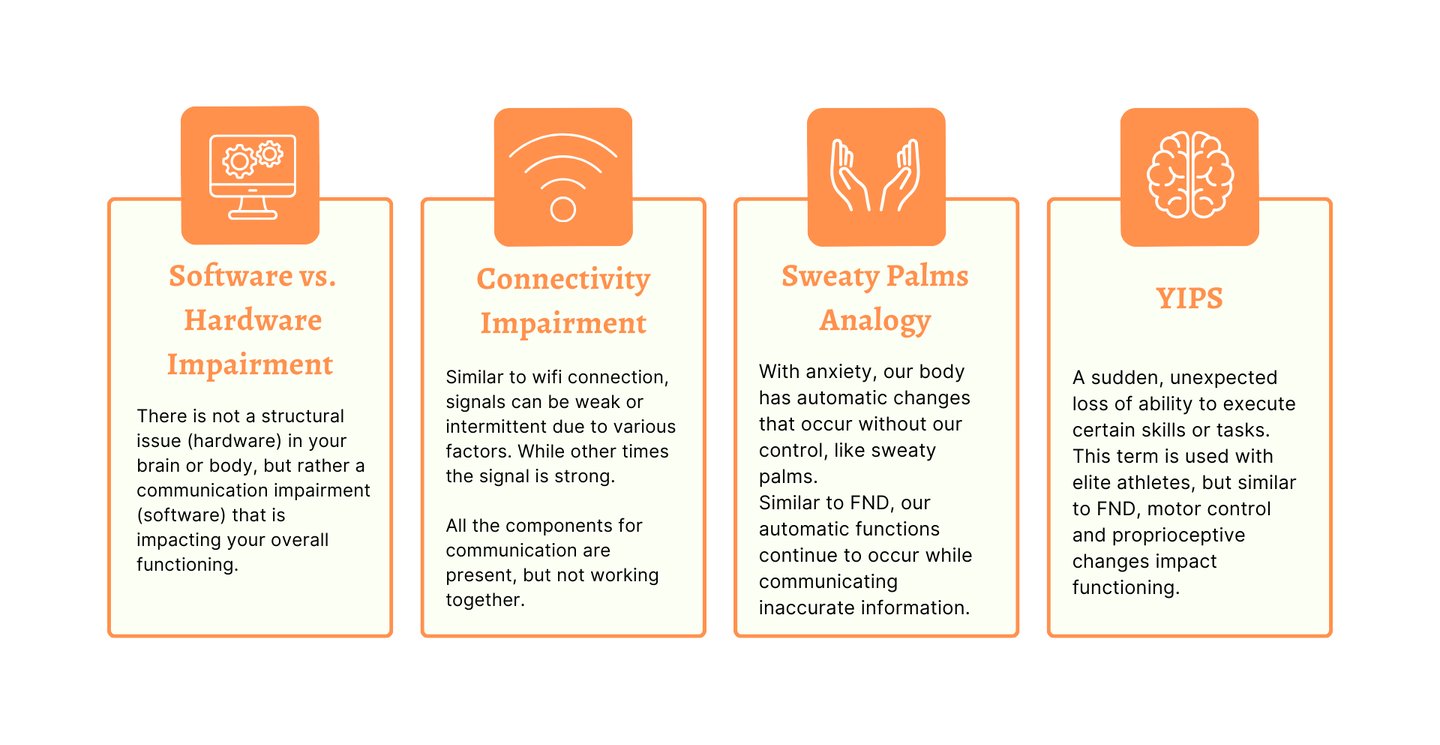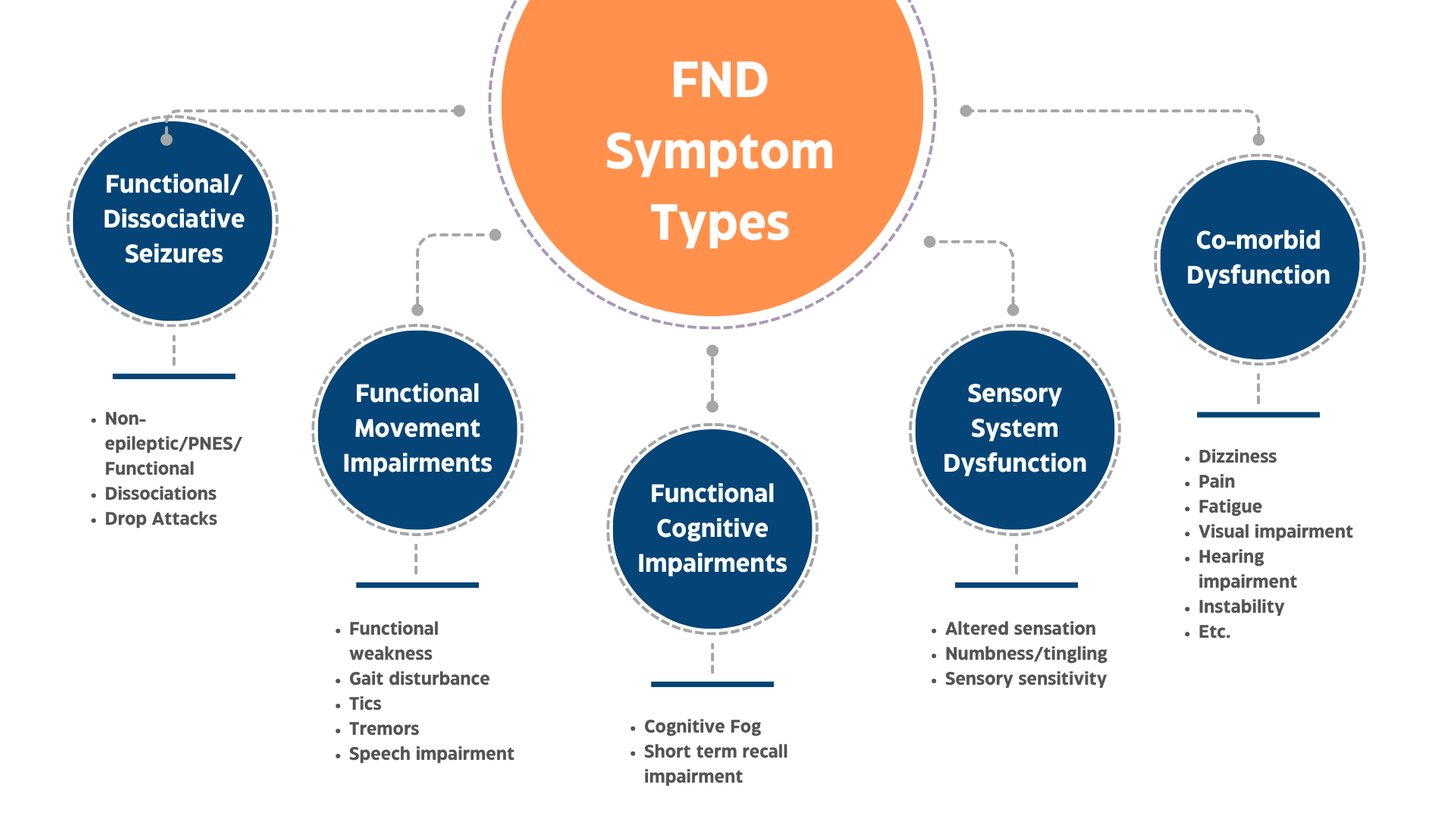What is FND?
Functional Neurological Disorder (FND) is a complex diagnosis that involves miscommunication or a disconnect between the mind and the body leading to various dysfunctions of the nervous system. This leads to unintentional symptoms that occur without a person's conscious awareness. FND often looks different between each individual and requires personalized treatment. FND is a complicated and often confusing diagnosis that deserves more attention and awareness from the medical community. Symptoms can present as functional weakness, functional movement impairments, functional seizures, sensory changes, cognitive changes and more.
Changes in nervous system and sensory functioning have been observed through research and through various tests that are not readily accessible at most hospital. Some of these changes could include:
Interoceptive awareness changes- Our "eight sense" which helps our bodies to perceive and interpret signals from within our body, such as thirst, pain, hunger, tension, heartbeat, temperature and anxiety.
Alexithymia- impairment in our ability to identify, understand and describe emotions
Sensory system changes- This is the way our environment influences how we function each day. Often those with FND are more sensitive to environmental changes around them.
Amygdala functioning- our emotion processing center becomes less responsive to repeated information from our nervous system.
Dysfunction of Right Temporal Perietal Junction (TPJ)- coordinating agency (ones control of self) and sensorimotor function. The rTPJ helps with out ability to sustain attention, divide attention and have necessary proprioceptive awareness (where our body is in space).
Increased Limbic System activity- regulates and processes emotions, behaviors, motivations, memory and autonomic nervous system functioning. The autonomic nervous system helps to regulate our non-voluntary bodily functions such as sweating, salivation, temperature control, bladder control and digestive functioning which helps our body know how to survive and thrive in a changing environment.
Potential Factors Influencing FND Onset
Predisposing factors
These are biological, psychological or social factors that make someone more susceptible to develop a disease or disorder. These can be genetic, inherited, caused by persistent habits or prolonged concerns, such as chronic fatigue, stress, anxiety.
Knowing your predisposing factors can help you be aware of diseases/disorders you are at risk for, help jump start lifestyle or habit modifications and proactively buildup tools for self management.
Perpetuating factors
These are factors that perpetuate or allow various symptoms, illness, or disorder to persist. Examples include lack of social support, poor work life balance, chronic fatigue/pain, unhelpful coping styles, financial instability, chronic anxiety or depression and persistent symptoms.
These are the factors addressed during therapy, with an aim to improve independence through personalized recovery. Tools to address this include, but not limited to, the use of interoceptive training, sensory regulation, graded exposure and pacing practices
Precipitating factors
These are factors that initiate or promote the onset of illness, injury or disorder; otherwise known as a trigger. These can include life transitions, situational stressors, heightened sensory sensitivities, physical trauma/surgery, insufficient coping skills, persistent negative interoceptive changes and more.
There isn't always an obvious stressor or precipitating event with FND. It is important to know that we are all wired differently and have different lived experiences. Thus, our nervous system will utilize protective responses in different ways.








